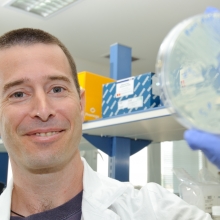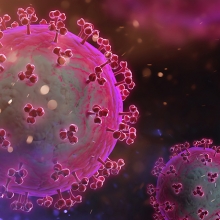Digitizing blood
Sarah Levy Schreier infuses artificial intelligence into blood testing
Alumni

Sarah Levy Schreier (MSc, 2013) has been on the fast track to leadership since she joined ‘Talpiot,’an elite Israeli army program in which talented young recruits earn a BSc in physics and mathematics alongside their military training. Recognized as the top of her Talpiot class, she went on to serve 10 years in the Israel Defense Forces, managing cybersecurity units and directing technology development projects.
Such experiences could easily have catapulted Levy Schreier into a top position in high-tech, something she indeed eventually achieved. Before taking the leap, however, she decided to immerse herself in theoretical physics. And, she recalls, there was no place better to pursue this than at the Weizmann Institute of Science.
“I took some graduate-level courses while in the army, but realized that if I wanted to concentrate on my studies, I should wait until I finish my service,” she says. “The Weizmann Institute was known as a tough program, where physicists learned to solve really difficult problems. Even today—now that I’m managing a company and recruiting staff—Weizmann is one of the most prestigious sources for physics talent.”
Levy Schreier is currently Chief Technology Officer for Sight Diagnostics, a company that has developed an artificial intelligence-driven platform for fast and accurate blood analysis. The company’s first product, called Parasight, visually ‘digitizes’ blood, and uses digital microscopy and AI to detect the presence of malaria based on visual characteristics like parasite size and shape.
Now, under Levy Schreier’s direction, Sight Diagnostics, in Tel Aviv, is launching a lab-grade system that delivers blood test results to patients within minutes rather than the usual days, enabling clinicians to quickly begin treatment based on the results of CBCs—complete blood counts, the most commonly used blood test.
“Using a large enough amount of data, computers are now able to perform decision-making tasks based on patterns and trends that cannot be identified by humans alone,” Levy Schreier says. “Machine learning and AI makes it possible to collect new data from digitized blood, with huge implications for clinical medicine.”
She was responsible for assembling the ‘dream team’ that develops Sight Diagnostics’ technologies. She also recognizes how AI advances are creating challenges and concerns.
“The data collected about every single person can be used to help improve our lives, but can also be exploited to threaten our freedom, privacy, and security,” she says. “When machines gain the capability to generate creative ideas faster and more effectively than humans, I believe there will be a real threat to humanity that we need to be prepared for.”
Providing solutions for such complex scenarios will depend on scientific knowledge, Levy Schreier says.
“Physicists are good at solving complex problems involving large data sets, and that’s why we need to be part of the broader AI discussion, alongside experts from other backgrounds, including the humanities,” she says. “As I continue to build my team at Sight, I’ll be looking for the kind of problem-solving skills I acquired during my training at the Weizmann Institute.”








